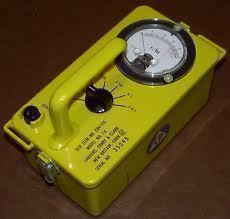What is a Geiger Counter?
A geiger counter is a device that detects (esp. nuclear) radiation by conducting electricity when an ionized particle is present. While geiger counters are not the only devices that detect radiation, they are the most preferred option worldwide due to their portability and low cost. Geiger counters are most often used after environmental and industrial catastrophes that result in some form of radiation leaking into the atmosphere, a water supply, or the ground.
How Geiger Counters Work
Geiger counters consist of a tube filled with an inert gas such as helium, argon, or neon, that temporarily conducts electricity when an ionized particle or photon comes in contact with it. An ionized particle is any particle that carries either a high-energy negative net charge or high-energy positive net charge. Ionized particles are found in an area of the upper atmosphere known as the Ionosphere, but geiger counters most commonly detect them on people and objects near nuclear power plants and those who have been exposed to large doses of x-rays or sunlight over a long period of time. When an ionized particle comes in contact with the inert gas of a geiger counter, it passes some of its energy to the gas, which is then conducted from one gas particle to another and transferred to lights, alarms, or measuring devices on the geiger counter.
Applications
Geiger counters have two purposes. A geiger counter’s primary purpose is to detect nuclear radiation on objects, people, or areas that may have been exposed to a radiation leak from nuclear power plants, a radioactive material, or high doses of x-rays or sunlight. Because of this, geiger counters are often found in airports, hospitals, nuclear power plants, and other locations that are potentially at risk of being exposed to radiation. Its secondary application is to count neutrons in a gamma ray sample by exposing boron trifluoride to the gamma rays and collecting alpha particles that accumulate inside of the geiger counter.
Advantages
Geiger counters are small and portable, allowing them to be used in the field and in virtually any circumstance. Geiger counters are also relatively inexpensive, allowing many government agencies, commercial organizations, and domestic users to afford them.


Comments - No Responses to “What is a Geiger Counter?”
Sorry but comments are closed at this time.